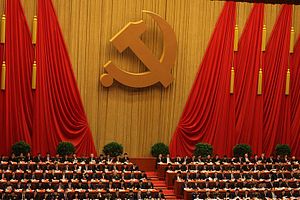Tens of thousands of leaked documents tie Chinese elites—include political leaders and their relatives—to offshore accounts in tax havens like the British Virgin Islands and Samoa.
The investigation was done by the International Consortium of Investigative Journalists working alongside media outlets and journalists from around the world. It is part of a larger investigation being done by the ICIJ of some 2.5 million leaked documents on offshore accounts by political and business elites from around the world. ICIJ says that the greater China investigation is the “largest segment of the 2.5 million leaked offshore records” the group has obtained.
Its initial report on greater China said ICIJ found “22,000 tax haven clients from Hong Kong and mainland China.” Another “roughly” 16,000 tax haven clients come from Taiwan, according to the report. Altogether, “by some estimates” the group said that “between $1 trillion and $4 trillion in untraced assets have left the country since 2000.”
Although ICIJ said it would release the full list of Chinese clients holding offshore accounts on Wednesday, the initial report did list some of the more high-profile clients it unearthed. They included a brother-in-law of current president Xi Jinping, a son and son-in-law of former Premier Wen Jiabao, the son-in-law of former paramount leader Deng Xiaoping, the daughter of former Li Peng, and a couple of members of China’s legislature. A number of senior officials at the state-run oil companies — which has been the target of multiple recent corruption probes — were also named by ICIJ.
ICIJ also listed some of China’s richest individuals as offshore tax clients, including Ma Huateng and Zhang Zhidong, the co-founders of the internet giant Tencent, as well as Zhang Xin, co-founder of the property developer SOHO China. Ms. Zhang recently made headlines when she outbid Hollywood actor Brad Pitt for a Manhattan townhouse that she paid some $26 million to acquire.
The use of offshore entities is in many cases not illegal, and ICIJ noted that some of the companies using them had reported their offshore entities’ activities in their corporate filings. However, the report also notes that “many Chinese companies and individuals have used offshore entities to engage in illicit or illegal behavior.”
This is corroborated by high-profile corruption cases that Chinese authorities have prosecuted in recent years. For example, in 2011, Song Jun, a vice general manager of the tainted Qingdao Ocean Shipping Co. Ltd, was arrested for siphoning off millions of dollars of corporate earnings in as many as 37 offshore properties. His story is far from unique, as the ICIJ report makes clear. However, individuals with connections to high-level political and Communist Party leaders are widely believed to be shielded from prosecution.
The use of offshore entities and accounts also helps distort Chinese economic data, although by how much is impossible to know. ICIJ cites the well-known tactic of “round-tripping,” which it described as Chinese companies “setting up subsidiaries outside the country, then selling their products at low cost to the subsidiaries, allowing the parent companies to avoid taxes by showing little or no profits inside China. The offshore entities in turn resold the goods at profitable markup — then slipped the profits back to the parents as untaxed “foreign investment” from the BVI or Hong Kong.” Round-tripping thus distorts both the foreign investment and trade numbers that China reports.
Last week China released its trade data for 2013 and said that it was “very likely” that it had overtaken the U.S. as the world’s largest trading nation.
The initial reports on the ICIJ’s six month investigation into the Chinese documents come the same week that many of the leaders of the New Citizens Movement are set to stand trial. The New Citizens Movement is a loose-knit civil society group that has demanded greater transparency from government and party officials in China. Many of its leaders were arrested shortly after they began holding rallies that demanded that Chinese officials be required to disclose their financial assets.
It also comes amid Xi’s much touted anti-corruption campaign against the Communist Party.

































